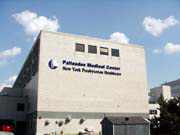Physicians who work out of Palisades Medical Center in North Bergen have, as of press time, unanimously agreed to join the statewide work stoppage scheduled for Monday, Feb. 3, in an attempt to force legislators to take action against soaring malpractice premiums.
Palisades Medical Center’s 147 resident physicians met last Friday and voted to support a job action that has been scheduled throughout the state.
The hospital’s administration also supports the job action.
“The job action is intended to increase public awareness and to increase the state legislators’ awareness that we are in dire need of some malpractice insurance reform,” said Bruce Markowitz, the president and chief executive officer of Palisades Medical Center. “In light of the rising malpractice insurance rates, we feel that not only physicians, but hospitals as well, are in jeopardy. We would support legislation that would include caps on malpractice rates. Because of that, we feel that this is a reasonable action being taken by our physicians.”
The unprecedented work stoppage, which has been gathering steam at a series of hospital staff meetings in the past few days, will mean that patients who plan elective surgery or need non-emergency care will have to wait or go elsewhere. Patients with medical emergencies will still receive proper care.
“The malpractice crisis threatens patients’ access to care,” Markowitz said. “I know that some OB-GYN practices have just dissolved and a large number of specialists and physicians have just stopped practicing or moved out of state. New Jersey has the highest malpractice insurance rates and an increasing number of large jury awards. Premiums have risen 40 to 50 percent each year.”
“We need to speak out as a physician community to make the public aware of what is going on,” said Ruth Schulze, a Ridgewood obstetrician-gynecologist. “If this is not fixed, this is how the public’s care will be affected in the future.”
Some physicians have told the administration that they will clear their schedules for a week, others for as long as it takes to get the state legislature to act.
The physicians want new limits on the financial awards, including a maximum of $250,000, that victims of malpractice can receive, which they blame for causing their insurance rates to rise.
Doctors in West Virginia staged a similar work stoppage on Jan. 1, which forced patients to seek care in neighboring states. The walkout proved to be successful when the West Virginia state legislators approved a cap on malpractice awards.
Doctors in Pennsylvania threatened to walk out, but the work stoppage was called off when legislators reached an 11th-hour agreement.
According to the American Medical Association, New Jersey is considered one of 12 “crisis states” in need of for reform of malpractice laws. Doctors’ premiums for the mandatory coverage have increased by 50 to 100 percent or more in the past year, especially in high-risk specialties such as obstetrics, surgery, and radiology. Some doctors here have retired early, moved, or limited the scope of their work because of the high rates.
While he appears to be sympathetic to their pleas, Gov. Jim McGreevey said last week that he “fully expects physicians will live up to their Hippocratic oaths and not put the health and welfare of their patients at risk.”
Because of the proposed work stoppage, all non-emergency services, such as elective surgery, endoscopies, colonoscopies, and mammograms, would be suspended.
Babies would be delivered but it was unclear, however, whether cancer treatments, such as chemotherapy in physicians’ offices, would continue.
Markowitz assured that Palisades Medical Center’s emergency room would not be compromised.
“The ER will remain open without interruption,” Markowitz said. “We’ve added staff and made the appropriate contingencies. Palisades General will always remain there for the community. We will remain fully staffed with no break in services.”
The doctors feel that this is the last resort.
“The last thing in the world we want to do is hurt patients,” said Dr. Steven Shikiar, a surgeon at Palisades General and the vice president of the Hudson County Medical Society. “But all elective medicine will stop on Feb. 3, essentially indefinitely. I think the governor has turned a deaf ear to the situation in New Jersey.”
To date, McGreevey has not supported limiting malpractice awards. A spokesman said in a statement that “the governor is committed to helping doctors in a way that does not hurt patients. You don’t create another problem by leaving patients vulnerable. You don’t fix one problem by creating another one. To threaten to walk out, to put people’s health at risk, is not productive.”
McGreevey spokesman Micah Rasmussen said that McGreevey and the state lawmakers “are trying to work with doctors to solve the problem…Everybody is sitting down in good faith here.”
Markowitz has no idea what will transpire.
“There has been so much press and attention lately,” Markowitz said. “Before that, I don’t know if the general public realized there was a crisis. I think it has raised awareness. We have to see what happens.”
